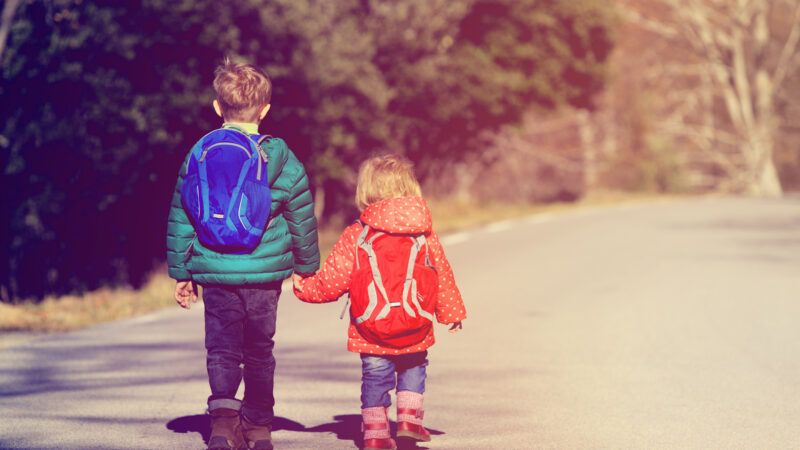Child Services Shouldn't Bother Moms Who Let Their Kids Walk Home From School
We're not criminalizing danger. We're criminalizing childhood independence.

The South Carolina mom who wants her kids' elementary school to allow them to walk home alone could find herself facing an investigation.
Ominously, at the end of a local news story about Jessie Thompson's quest to get her kids' school to permit them to enjoy some fresh air, the anchorwoman said, "Social Services could be called if the children are left to walk home on their own."
"Left" to walk home. As if the mom is abandoning her kids, rather than trusting them.
The story, chronicled here, involves Thompson, a mom of four. Her three youngest, ages 9, 10, and 11, attend Spann Elementary School in Summerville, South Carolina. They already walk alone in that neighborhood—and look both ways before crossing—on their way to extracurriculars. But the principal has said they can't walk home from school without an adult present. Thompson must come pick up the kids, or the school will put them on the bus.
The school is situated off a four-lane highway, mistakenly identified as a six-lane highway by the TV reporter. (It has extra turning lanes.) "The Thompson family lives on one side of the parkway and Spann Elementary School is on the other," intoned the reporter as the camera dramatically zoomed out to illustrate the intersection.
It has a crosswalk as well as Walk/Don't Walk signs. If the school believes no child can traverse this safely, why not station a crossing guard there, rather than insisting that each and every parent come fetch their kids?
The bus ride takes longer than the walk: During COVID-19, it actually seems less safe than the fresh-air option. As for insisting a parent come pick up the kids, this is a burden on anyone who can't afford to leave her job in the middle of the day. Presumably, child protective services has better things to do than investigate parents whose kids walk home from school.
For Thompson, the issue is simple: Why is the school allowed to dictate what kids do once they leave school property? A lawyer for the district, Christy Graham, said the school is wary of liability issues. An "additional concern of the district [is] for our students not to be harmed."
But how far into the children's home life does the school's right to be concerned" extend? It doesn't dictate where the kids can walk on evenings and weekends, after all.
"I'm not naïve," says Thompson. "It's a major intersection." But just because it's not 100 percent safe doesn't mean it's 100 percent dangerous. No intersection can be guaranteed safe, but neither can a car ride to or from the school. Indeed, car passenger deaths are the number one way children die in America. Yet no one stops parents from driving their kids home.
We aren't really criminalizing danger—we're criminalizing parents who don't helicopter. Which means we are criminalizing childhood independence.
With any luck, South Carolina will pass the Reasonable Childhood Independence Bill that had passed the Senate unanimously and was working its way toward the House before the pandemic shut the legislature down. Parents know their kids best. If they believe their kids are ready for a time-honored independence milestone, they should not be threatened with an investigation for neglect. Not by schools, and not by the media.


Show Comments (56)